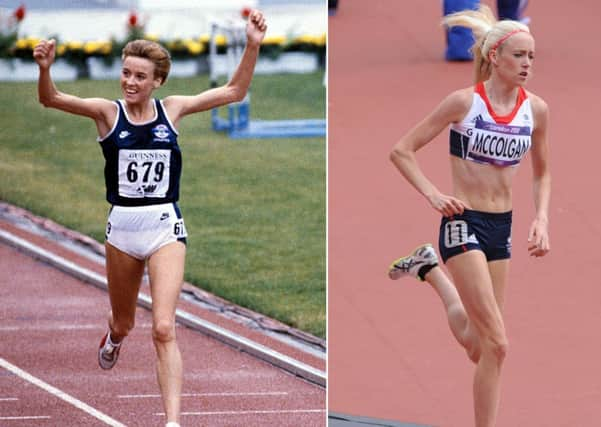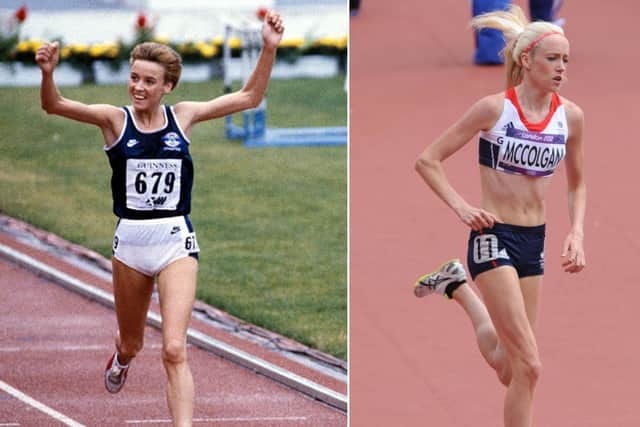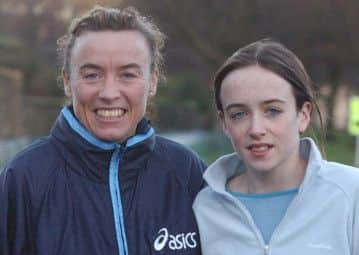Liz Lynch and Eilish McColgan, a family affair


THE first time I saw Liz Lynch run, she ran into history. It was Meadowbank Stadium, a dreich summer afternoon in 1986, and there was lightning in the air. This was the Commonwealth Games, the final of the 10,000 metres. I was there with my grandfather, a bus-builder and athletics addict who had seen the great Fanny Blankers-Koen triumph at the 1948 Olympics in a London still in ruins from the Blitz, and who had brought me here now – I was 12 – in the hope that I might understand what it was to witness a famous victory, to be alive in that moment. There was this “wee Scottish lassie” who had, it was felt, an outside chance.
In the end, she made it look easy, running away with the race, setting a new Commonwealth record, and causing a few thousand damp saltires to be lifted, gloriously and incredulously, into an Edinburgh sky the colour of cold porridge. The noise was almost frightening in its intensity. A crowd surprised by joy. The sound of a people used to losing, winning for a change. And at the centre of it all, draped in flags, hugging her father, this young woman from a Dundee scheme, in her early twenties but still something of a gawky teen. A national heroine wet with sweat and rain.
Advertisement
Hide AdAdvertisement
Hide Ad“I was very confident in my ability to win it. There was nobody going to beat me that day,” Lynch recalls. Since her divorce last year she no longer uses the surname, McColgan, by which she is better known. “My last two laps were amazing – running, knowing that you’re winning and that everybody is there with you. It was like everybody in the stadium won that medal. It wasn’t just me. Everybody took part in it. I went in the lead with just about 800 metres to go, and all I could hear was this roar as the crowd lifted the stadium. Absolutely amazing. I never experienced ever again in my whole athletic career what I experienced in Edinburgh.”


Lynch, now 49, went on to become one of Scotland’s greatest ever sports stars, adding an Olympic silver in 1988, retaining her Commonwealth gold in 1990, and winning the New York, London and Tokyo marathons. An injury forced her retirement in 2001, which she found difficult, but she foresees an even greater future through her involvement in the career of her daughter, Eilish McColgan, whom she has coached since her early teens.
McColgan will compete in Glasgow this summer in the 3,000 metres steeplechase. “I have one the best teachers in the world,” says the 23-year-old. “I can’t ask for anything more.” Still, it will not be easy. There is stiff competition from the Kenyans in particular. But this will be the first time the Commonwealth Games have been held in Scotland since 1986, and who among the crowd and the Scots watching at home will not have their heart set on the fairytale ending – the daughter, like the mother, with a medal round her neck and the stadium chanting her name? Lightning, one prays, will strike twice.
Lynch and McColgan have been resident in Loughborough, Leicestershire, since last summer. The university has world-class athletics facilities, and McColgan was keen to take advantage of expert physiotherapists while recovering from injury.
She is five foot ten, but, being coltish, appears even taller, and has striking pale blue eyes. Conscious of her words being recorded, she can appear solemn, but there is a sense of fun bubbling away somewhere on a low heat. Her life is that of the international jet set, but with all the grind of the jets, and none of the larks of the set. She has just returned from training in Oregon, and by the time this article is published will be training in Kenya, a five-week stay in spartan conditions at high altitude intended to boost her strength.


Not so long ago she was working part-time in a shop in Dundee and studying for a degree in maths and accountancy. “But with the Games being in Scotland, I want to give myself the opportunity to be a full-time athlete,” she says. “So I quit my job and finished university. It has made a big difference. Coming tenth at the World Championships was a massive achievement for me. If someone had said to me at the start of 2013, ‘Would you be happy with tenth in the world?’ I would have bitten their arm off.”
Her mother has been her coach since McColgan was 13. They are at the track together three or four times a week, and meet in the evenings to talk through the programme. McColgan was part of Team GB at London 2012. She had come back from a badly broken foot (“I’ve never felt pain like that” – the surgeon thought she must have been in a motorcycle accident) to make the Olympic team, but was disappointed with her failure to qualify for the 3,000 metres steeplechase final, nerves having got the better of her. The Commonwealth Games will be different. Older, faster, stronger, more experienced, she’ll be a real contender.
“Glasgow will be massive,” she says. “For my family it’s obviously big, because my mum won in ’86. At the Worlds in Moscow, I was out there on my own. My mum and dad couldn’t afford to come over. So it’ll be nice that there will be people in the stands who actually know me. That will make me try to perform to the best of my ability, rather than panicking the way I did before. Everyone was saying, ‘You won’t ever hear anything as loud as London.’ But a Scottish crowd is going to be absolutely mental.”
Advertisement
Hide AdAdvertisement
Hide AdMcColgan grew up in Carnoustie, the eldest of five children. Her father Peter McColgan comes from Northern Ireland and was an excellent steeplechaser; he and Liz met while both were on a sports scholarship in Idaho. They married in 1987. Eilish’s childhood was “a little bit different”. Her parents were always out running, or else away travelling to races, on which occasions she would stay with her maternal grandparents. She thought of mum and dad as runners, but had no sense of the high level at which they were competing. “Then in Primary Seven, I had a school race in Angus, and there were loads of people huddled round my mum getting autographs. I remember thinking, ‘Why are all these people round my mum?’ It wasn’t until I started doing the sport myself that I realised how difficult it is to be the best in the world. When I was younger I didn’t appreciate what an achievement that is. She was on a completely different level.”
Her parents split in 2010 and she remains equally close to both. “I stayed out of it as much as I physically could. It wasn’t me going through a divorce. But in a way, my running did help. Even if things were really bad, I could switch off and concentrate on myself and my training, and put so much effort and hard work into that to avoid thinking about everything else. These have been the worst couple of years within my family, but I’ve had my best performances ever just because all of my focus and energy has gone into that.”
What is it like, though, to be coached by her own mother; to have that deep, intimate professional relationship with her closest flesh and blood? “Because I am her daughter, she knows me very well. But when we’re at the track she’s my coach and I respect that.” In Dundee, Lynch was coaching a training group of around 30, including Eilish, “and I never got special treatment. I was just another kid down at the track who wanted to run.”
Lynch concurs. “The mother daughter thing never really comes into it and never has,” she says. “It’s a really odd sort of relationship. If you were at the track, you wouldn’t really think we were mother and daughter. We’re definitely coach and athlete, and there’s a respectfulness on both sides.”
Coaching her daughter has helped her cope with the sense of frustration and loss that accompanied her forced retiral from athletics in her thirties. Lynch still runs every day, though, between 55 and 70 miles a week, which sounds a lot but is piddling in comparison with the 120 miles she was running at her peak.
Lynch was raised as a Catholic, and her faith has come and gone over the years. I asked whether it had sustained her as a competitive athlete and she said no, and in retrospect that was a stupid question. Running could not be helped by faith; for Lynch, running is a sort of faith, chastening and consoling, and functions as a form of prayer – a daily meditative ritual that brings peace and mental clarity, and always has.
“Running’s always helped me go through the personal stuff,” she says. “That’s probably one of the reasons I started running – for the emotional thing I needed from it.” She grew up on Dundee’s Fintry scheme, and is of that generation of children who would go berry-picking and tatty-howking with their families in order to earn money for the coming term’s school uniform. The Lynch family were close-knit. She is the youngest of four. The kids were raised to be competitive, and to understand that nothing in this life was going to be given to you. Hard work, that was the only way to get anywhere.
Perhaps because of her gender, this is never really said, but Liz Lynch was a classic working class hero – transcending a difficult start through sheer talent and will, yet never forgetting or denying her roots. “For me as a child, running was an escape from the lifestyle that we had. I had quite a tough upbringing. It was a tough time for families back then. There was a lot of poverty. Running just took me away from it. My mum and dad didn’t even know I was running for the first couple of years. I’d just take myself off and do it.
Advertisement
Hide AdAdvertisement
Hide Ad“Because of where I came from, a council estate, I was always written off. But through my running I had my first experience of someone actually saying I could be someone and be something. That happened when I was 14, 15.” This was her first coach, Harry Bennett of the Dundee Hawkhill Harriers, “a second father” who, sadly, would die before his time and never see her win the 10,000 metres at the Commonwealth Games – a victory he had predicted. “He came up to me and said, ‘You’ve got it. It’s going to happen for you.’ Nobody ever in my life had said that. At school all I got told was ‘Your brains are in your feet. You’ll never do anything.’ No support whatsoever.”
Lynch had been working at this time in a jute mill, near 12-hour shifts, starting at half-five in the morning. She had left school as soon as she could, glad to escape the bullying. This was the girl to whom Bennett said that if she would focus on running, heart and soul, then she could be one of the best in the world. “That was awkward because I was a really shy person and not used to anyone being the slightest bit positive about me. But if he had said jump off the Tay Road Bridge I’d have done it. He just had that hold over me.” So she quit her job, signed on the dole, started training twice a day – “and the rest is history”.
On November 25, 1990, Eilish McColgan was born. Eleven days after the birth, Liz was back out running. Eleven weeks after the birth she won bronze at the World Cross-Country Championships in Antwerp. Within a year, she was the fastest in the world at 10,000 metres and had won the New York Marathon on her debut at that distance. “Nobody had really got back into successful athletics at that level after having a kid. Everybody wrote me off. So I had a point to prove. I wanted to prove my doubters wrong.”
She believes, looking back, that she was actually too intense. “It would have been good to just take the foot off the pedal a wee bit. When I was world champion I should have taken the time to celebrate that and I didn’t. I was BBC Sports Personality Of The Year and I didn’t go to the after-party because I had a 15-mile run to do in the morning. There’s no memories of the fun of the success, and that’s the downside of my whole career – that I didn’t give myself those happy memories. That’s my nature. I’ve got to keep on proving I can be better, I can be better, I can be better. Something I always try to instil in Eilish and other athletes now is, ‘Take the time to enjoy it and live the moment.’”
Lynch is very different from the person I expected to meet. Press cuttings from her pomp suggested a woman dour and taciturn. In fact, she is upbeat, quick to laughter, and open to self-reflection. She appears much altered since the end of her marriage. It was a very public mess played out in court. In November 2011, she was found not guilty of assaulting Peter McColgan, later saying that he had tried to control everything she had done. “I’ve really changed as a person from what I was like a few years ago,” she says now. “I’ve been through every emotion you could possibly go through, and I’m still standing.”
She is in a relationship with John Nuttall, the former Olympian middle-distance runner turned coach. I notice a ring on her finger and she confirms they plan to marry. He is, she says, her soulmate. “I’m just really happy to find someone who has helped me through a difficult stage of my life and loves me for who and what I am.”
Her focus is on the future. Glasgow 2014, Rio 2016, not Edinburgh 1986 or Tokyo 1991, regardless of the greatness of her own achievements. Eilish, she says, is a far better athlete than she ever was, full of potential, and over the next six years will blossom as an endurance runner. Were Eilish to win a Commonwealth medal, it would mean more to her than her own.
“Now,” Lynch says, “with everything that’s happened to me, and having to live the worst part of my life out in the media and still keep my head up, I feel that I’m in a better place as a person. My running has kept me sane all through it. It’s helped me exactly the same way when I’m 50 as it did when I was 12. It’s come full circle. Now I’ve got a daughter whom I’m really proud of, and I’m honoured and blessed that I’m in a position to help her.”
For more information, see eilishmccolgan.blogspot.co.uk